by M. C. Jennings | May 9, 2023 | Academics, Accounting, Current Students, Faith Infusion, MAcc, Research, Student Spotlights, Uncategorized
Written by special contributor Lance Fleming
Each day, students across the ACU campus display the university’s mission to educate students for Christian service and leadership throughout the world through their actions and acts of service on the campus. Each year, students like those are nominated by their academic departments. From those nominations, 50 scholars are selected by the ACU Faculty Senate to receive the University Scholars Award for their graduating class.
Among those 50 scholars who demonstrated outstanding scholarship by maintaining a grade point average (GPA) of 3.5 or higher, earning 90 hours towards their degree, and continuing the pursuit of knowledge in their research field, seven are students from the College of Business Administration. The COBA students who received this year’s University Scholars Award are Kathryn Crawford, Gracie Isham, Matthew Roberson, Will Harris, Diego Lozano Welsh, Ben Blackmon, and Garrett Powell.
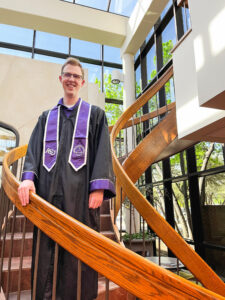 We will highlight each of the seven over the next month, including this profile of Matthew Roberson, a native of Weatherford who carries a 4.0 GPA and is graduating with a degree in accounting. After graduation, Matthew plans to complete his Master of Accountancy with ACU and continue his audit internship with Condley and Company.
We will highlight each of the seven over the next month, including this profile of Matthew Roberson, a native of Weatherford who carries a 4.0 GPA and is graduating with a degree in accounting. After graduation, Matthew plans to complete his Master of Accountancy with ACU and continue his audit internship with Condley and Company.
Matthew has served as Vice President of Fundraising for ACU’s chapter of the International Justice Mission and was also a member of the Alpha Chi National College Honor Society and the Beta Gamma Sigma Honor Society.
Matthew recently answered a few questions about his time at ACU and in COBA, covering everything from his most influential class to the most unique thing he’s been a part of while at ACU:
Q: What is the most important thing you’ve learned about yourself at ACU?
Roberson: “I’ve learned that I value relationships more than academic or work success. Investing time to know the people I am around provides me with the most fulfillment.”
Q: What professor or class has impacted you most and why?
Roberson: “This one is tough to answer. Each professor I have had at COBA has profoundly impacted my life, and I cannot honestly rank who has done so the most. However, the class that most influenced the trajectory of my life was Financial Accounting 210 with Dr. Clint Buck. Before taking that class, I struggled with finding purpose and fulfillment in my previous major. While Dr. Buck provided a logical foundation for accounting principles that I still rely on to this day, the most important thing he did was help me understand why and how accountants bring good into our communities. All I needed was the ‘why’ and the ‘what’ followed soon after.”
Q: What has been your experience in COBA?
Roberson: “My experience in COBA has been unparalleled. I transferred to ACU in the second half of my junior year, and I fully expected COBA to be like the other academic environments I had experienced. However, I was happily proved wrong. There is a familial atmosphere at COBA that I was hard-pressed to find elsewhere. The professors pushed me to be the best I could be, but I never once felt like I had to go it alone.”
Q: Of all the things you’ve experienced at ACU, what do you believe will have the most impact on your life?
Roberson: “The connections I have formed at ACU will impact my life the most.”
by M. C. Jennings | May 5, 2023 | Academics, COBA Faculty, Current Students, Faith Infusion, Financial Management, Management, Outcomes, Research, Social Entrepreneurship, Student Spotlights, Uncategorized
Written by special contributor Lance Fleming
Each day, students across the ACU campus display the university’s mission to educate students for Christian service and leadership throughout the world through their actions and acts of service on the campus. Each year, students like those are nominated by their academic departments. From those nominations, 50 scholars are selected by the ACU Faculty Senate to receive the University Scholars Award for their graduating class.
Among those 50 scholars who demonstrated outstanding scholarship by maintaining a grade point average (GPA) of 3.5 or higher, earning 90 hours towards their degree, and continuing the pursuit of knowledge in their research field, seven are students from the College of Business Administration. The COBA students who received this year’s University Scholars Award are Kathryn Crawford, Gracie Isham, Matthew Roberson, Will Harris, Diego Lozano Welsh, Ben Blackmon, and Garrett Powell.
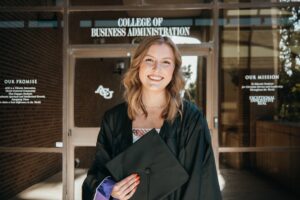 We will highlight each of the seven over the next month, including this profile of Kathryn Crawford. A native of Flower Mound, Texas, Kathryn carries a 4.0 GPA and is graduating with a BBA degree double majoring in Financial Management and Management with a concentration in Leadership. After graduation, she will travel this summer and serve as a Resident Advisor for the Leipzig Study Abroad program.
We will highlight each of the seven over the next month, including this profile of Kathryn Crawford. A native of Flower Mound, Texas, Kathryn carries a 4.0 GPA and is graduating with a BBA degree double majoring in Financial Management and Management with a concentration in Leadership. After graduation, she will travel this summer and serve as a Resident Advisor for the Leipzig Study Abroad program.
Kathryn is a member of Sigma Theta Chi and participated in Sing Song with her club each of the last two years. As a freshman, she was in Sing Song and directed a Freshman Follies Hall act. She also volunteered at Palm House as a freshman and sophomore and worked in the Lytle Center for Faith and Learning.
Kathryn recently answered a few questions about her time at ACU and in COBA, covering everything from her most influential class to the most unique thing she’s been a part of while at ACU:
Q: What is the most important thing you’ve learned about yourself at ACU?
Crawford: “I grow the most when I am challenged. Even though it can be difficult, pushing myself out of my comfort zone has been pivotal to my development personally, academically, and spiritually.”
Q: What professor or class has impacted you most and why?
Crawford: “The class that impacted me most at ACU was International Business. I had the opportunity to take this course abroad during my junior year when I spent a semester in Leipzig, Germany. I not only learned how countries engage with one another, but I was also able to experience first-hand how businesses operate outside the United States. Touring companies such as BMW and Leipziger Messe allowed me to gain a new perspective on the possible operations and organizational structures of businesses in a way that would not have been possible in a traditional classroom setting. I came to appreciate cultural collaboration and international business through this course and plan to pursue this area more in my future career.”
Q: What has been your experience in COBA?
Crawford: “For someone who didn’t know exactly what she wanted to do entering college, I could not have ended up in a better place to explore my passions and cultivate my skills than COBA. Surrounded by encouraging faculty, I uncovered new areas of interest each year. The support I experienced from a few specific professors, such as Dr. Jody Jones, helped me find my affinity for research and ignited a desire to continue my education beyond a bachelor’s degree. With unique courses such as social enterprise consulting and S.T.A.R., I immersed myself in real-life situations that forced me to apply classroom concepts to actual projects. Most importantly, I will walk away most grateful for the integration of faith into every single aspect of my experience from my time at ACU. Between equipping courses like Leadership Summit and the consistent spiritual encouragement from my professors, particularly Dr. Marquardt, I was exposed to an incredibly unique experience. I leave ACU well-rounded and equipped to enter life as a young professional with confidence only possible from the strong foundation in knowledge, faith, and purpose that COBA cultivated.”
Q: Of all the things you’ve experienced at ACU, what do you believe will have the most impact on your life?
Crawford: “My semester abroad will have the most impact on my life. This experience gave me a new perspective on the world around me and my role in it. I came to appreciate living outside my normal, everyday comforts and continually found myself enamored by the cultural nuances surrounding me everywhere I traveled. It solidified my ability to love and appreciate my neighbors regardless of their customs, traditions, or beliefs. I hope that I never stop seeing the world with the awe and wonder I felt during this time, and I pray that God will use that for his glory wherever life leads me.”
by M. C. Jennings | May 3, 2023 | Academics, Current Students, Faith Infusion, Research, School of Information Technology and Computing, Student Spotlights, Uncategorized
Written by special contributor Lance Fleming
Each day, students across the ACU campus display the university’s mission to educate students for Christian service and leadership throughout the world through their actions and acts of service on the campus. Each year, students like those are nominated by their academic departments. From those nominations, 50 scholars are selected by the ACU Faculty Senate to receive the University Scholars Award for their graduating class.
Among those 50 scholars who demonstrated outstanding scholarship by maintaining a grade point average (GPA) of 3.5 or higher, earning 90 hours towards their degree, and continuing the pursuit of knowledge in their research field, seven are students from the College of Business Administration. The COBA students who received this year’s University Scholars Award are Kathryn Crawford, Gracie Isham, Matthew Roberson, Will Harris, Diego Lozano Welsh, Ben Blackmon, and Garrett Powell.
We will highlight each of the seven over the next month, including this profile of Garrett Powell, a native of Aledo, Texas, who carries a 3.9 GPA while majoring in computer science with a focus on software engineering and minoring in mathematics. Garrett – who has been working as an intern for Funeral Directors Life Insurance Company – will go to work with FCLIC as a DevOps Developer.
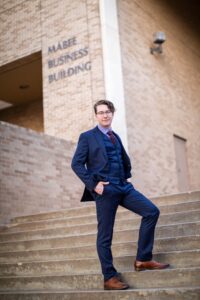 While at ACU, Garrett has been heavily involved in academic and campus life pursuits. He has served as Dr. James Prather’s research assistant, researching metacognition, programming error messages, and novice programmers. Seven of his articles have been published on various platforms over the last three years.
While at ACU, Garrett has been heavily involved in academic and campus life pursuits. He has served as Dr. James Prather’s research assistant, researching metacognition, programming error messages, and novice programmers. Seven of his articles have been published on various platforms over the last three years.
He’s also the chairman of the local ACM SIGCHI Chapter and is president of the ACU Swing Cats, the swing dance club on campus. Garrett has been with the group since the fall of his freshman year (2019-20) and was with the group on April 29 when it celebrated its 20th anniversary with a dance at the Elks Ballroom.
Garrett recently answered a few questions about his time at ACU and in COBA, covering everything from his most influential class and professor to the most impactful thing he’s been a part of while at ACU:
Q: What is the most important thing you’ve learned about yourself at ACU?
Powell: “Learning to interact and communicate with people from different areas of life, whether from other majors or societal backgrounds.”
Q: What professor or class has impacted you most and why?
Powell: “James Prather has by far been the most influential professor. He picked me up as a research assistant in the spring of my freshman year and has been a mentor ever since. He introduced me to the many ways we can improve people’s lives by implementing accessibility tools on our software. The most influential class would have actually had to have been a two-part class. Software 1 and 2, taught by Brent Reeves, greatly impacted me. He helped implement projects that reflected what working in the real world was like. It did a great job preparing me for what I see in my job day to day.”
Q: Of all the things you’ve experienced at ACU, what do you believe will have the most impact on your life?
Powell: “Being involved in Swing Cats has been the most influential part of my college experience. It brought me out of my comfort zone and moved me into a leadership position.”
by M. C. Jennings | Apr 29, 2023 | Academics, Accounting, Current Students, Faith Infusion, Social Entrepreneurship, Student Spotlights, Uncategorized
Written by special contributor Lance Fleming
Each day, students across the ACU campus display the university’s mission to educate students for Christian service and leadership throughout the world through their actions and acts of service on the campus. Each year, students like those are nominated by their academic departments. From those nominations, 50 scholars are selected by the ACU Faculty Senate to receive the University Scholars Award for their graduating class.
Among those 50 scholars who demonstrated outstanding scholarship by maintaining a grade point average (GPA) of 3.5 or higher, earning 90 hours towards their degree, and continuing the pursuit of knowledge in their research field, seven are students from the College of Business Administration. The COBA students who received this year’s University Scholars Award are Kathryn Crawford, Gracie Isham, Matthew Roberson, Will Harris, Diego Lozano Welsh, Ben Blackmon, and Garrett Powell.
We will highlight each of the seven over the next month, starting with Gracie Isham, the youngest of the four Isham siblings to attend ACU. A native of Decatur, she is a member of Ko Jo Kai, has served on the Executive CEO Leadership Board and the Executive Philanthropy Board, and sang in the Foundation and Grace Note a capella groups.
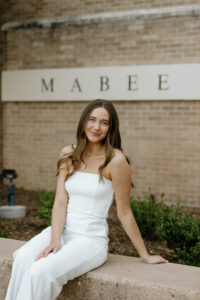 A double major in accounting and finance, she has already accepted a job offer at Weaver, an accounting firm in downtown Fort Worth. She is in the process of applying to schools across Texas so she can work toward getting her MBA.
A double major in accounting and finance, she has already accepted a job offer at Weaver, an accounting firm in downtown Fort Worth. She is in the process of applying to schools across Texas so she can work toward getting her MBA.
Gracie recently answered a few questions about her time at ACU and in COBA, covering everything from her most influential class to the most unique thing she’s been a part of while at ACU:
Q: What is the most important thing you’ve learned about yourself at ACU?
Isham: “The most important thing I have learned is that we all need community, and that community looks different for each individual. As I’ve gone through the troughs and peaks of college, my community has kept me stable and looking toward my purpose: to be a good steward of God’s gifts. With this being said, my definition of community has changed throughout my time here. I would have used to say that community looks like being plugged in with a vast group of people across all areas and interests in my life. Still, as my time in college ends, my definition of a true community has changed to this: my caring roommate that sews the hole in my shirt, my lifetime friend that walks my dog while I’m sick, my friend that offers me a prayer whenever I need, and my family who constantly supports all of my future ideas. Community isn’t about quantity but the quality of people who know you best.”
Q: What professor or class has impacted you most and why?
Isham: “The class that had the most impact on me was the strategic philanthropy class I am currently taking (The why behind this answer is located in the last question!).”
Q: What has been your experience in COBA?
Isham: “COBA has been a great experience overall. It has offered me many opportunities to grow by presenting me with leadership opportunities, networking events, and an overall supportive environment with people who want to see me succeed!”
Q: Of all the things you’ve experienced at ACU, what do you believe will have the most impact on your life?
Isham: “ACU’s constant push toward turning its faculty and students toward God will have the biggest impact on my life. I have grown spiritually through all the big chapels, small group chapels, the professor’s daily class prayers, and constant spaces of worship. The things I gained through these experiences are things I will implement into my life forever.”
Q: What is the most unique thing you’ve been a part of or learned at ACU?
Isham: “The most unique thing I have been a part of at ACU has been sitting as the chairperson of the Strategic Philanthropy Board. I have had the opportunity to visit various non-profits in Abilene and witness God’s good work through the people of each organization. Through this, as a board, we have chosen several non-profits to allocate $50,000 for their use. This has challenged me to engage in more philanthropic endeavors in my life and home community.”
by M. C. Jennings | Apr 21, 2023 | Academics, COBA Faculty, Current Students, Faith Infusion, International Business, Social Entrepreneurship, Uncategorized
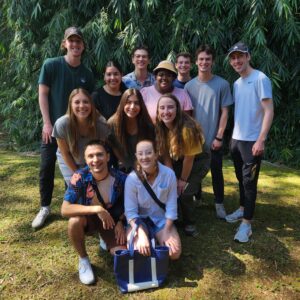 Written by special contributor Lance Fleming
Written by special contributor Lance Fleming
While most students around the country spent their Spring Break taking a break from college work and getting away from all things academia, 10 ACU students and their two professors spent a week in Costa Rica as part of the requirement for COBA’s Social Enterprise Consulting Class working with local entrepreneurs to launch products made from materials donated by Southwest Airlines.
Dr. Laura Phillips and Dr. Jennifer Golden are teaching the class this semester and took the students to Costa Rica to work with the husband-and-wife duo of Lynne Corvaglia and Chris Riquelme, who are creating “upcycled” bags and other products from leather donated by the United States’ busiest airlines.
As part of Southwest Airlines’ “Repurpose with a Purpose” program, each of the company’s fleet of airplanes is overhauled every four years, and as a part of that process, the seat leather is replaced. The leather pulled out of the planes is donated to nonprofit organizations for upcycling projects. One of the Southwest refurbishment facilities is in El Salvador, and the leather from that location has been donated to a university in Turrialba, Costa Rica, called CATIE.
CATIE is primarily an agricultural university, but it does have economic development as an area of focus.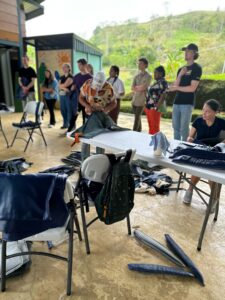 That is part of the university with which ACU students have partnered this semester. In addition to donating a warehouse full of airline seats, Southwest has also provided funds for CATIE to build a leatherworking workshop and to provide training for people in the area who are interested (primarily women). The women come from around the region to learn leatherworking and business skills.
That is part of the university with which ACU students have partnered this semester. In addition to donating a warehouse full of airline seats, Southwest has also provided funds for CATIE to build a leatherworking workshop and to provide training for people in the area who are interested (primarily women). The women come from around the region to learn leatherworking and business skills.
The idea is to create a business incubator to launch businesses as people graduate from the training program. Jobs are also being created in rural communities because CATIE receives intact seat covers that must be deconstructed before they can be upcycled into new products.
And that’s where the ACU students come in.
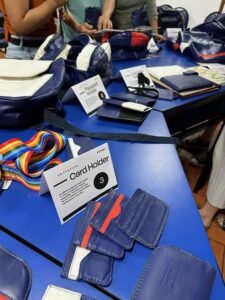 The students’ client is called Wearsos – the first business to come out of the leather project – and it was started by Corvaglia and Riquelme. Aside from upcycled bags, the company also plans to make other products like passport holders, wallets, luggage tags, and shoes, but according to Phillips, the initial launch will be with three different styles of bags.
The students’ client is called Wearsos – the first business to come out of the leather project – and it was started by Corvaglia and Riquelme. Aside from upcycled bags, the company also plans to make other products like passport holders, wallets, luggage tags, and shoes, but according to Phillips, the initial launch will be with three different styles of bags.
“Our task this year is to support Lynne and Chris as they get ready to launch their products,” Phillips said. “While we were in Turrialba, Costa Rica, we conducted focus groups with two different target markets: faculty, staff, and students on the CATIE campus, as well as Southwest Airlines employees.
“The first set of focus groups were done in person, while the Southwest Airlines focus groups were conducted via Zoom,” she said. “Our students are sorting through the information we collected through those sessions to provide marketing help to Lynne and Chris as they decide how to position the three products. That will also allow us to help them with information about shipping because they are working through the logistics of getting products from Costa Rica to the United States and Canada.”
The goal for the class, Phillips said, is to complete “one or two” consulting projects for the client, in this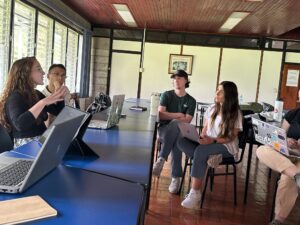 case, Wearsos. So far, in four years of teaching the class, each client has been in Costa Rica, although Philips said future classes could certainly take on a domestic client or a client in a foreign country other than Costa Rica. Phillips also said that she wants the students to learn problem-solving and critical-thinking skills each year to serve them when they enter the workforce.
case, Wearsos. So far, in four years of teaching the class, each client has been in Costa Rica, although Philips said future classes could certainly take on a domestic client or a client in a foreign country other than Costa Rica. Phillips also said that she wants the students to learn problem-solving and critical-thinking skills each year to serve them when they enter the workforce.
What the students will find, Phillips said, is that the context and scope of the project will always change between the start of the semester and the time they return from the Spring Break trip. In addition, the on-site schedule over Spring Break is always fluid, forcing students to adjust their plans, which is more difficult for some students than others.
“We want the students to become much more comfortable dealing with ambiguity and learning to be flexible, both in a project context and a general life context,” Phillips said. “We hope the students learn how to be good team members. Most students have had several group projects by this point in their college careers. In many of these cases, the work is distributed unevenly across the team, with some students pulling more than their weight and others free riding. This is an opportunity for them to work in a group where everyone wants to be involved and contribute.
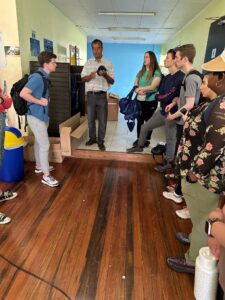 “Finally, we hope the students will learn that consulting (and any cross-cultural project) is a co-creation between the parties involved,” she said. “We do not go to Costa Rica to solve our clients’ problems or fix their issues. We work with the client to develop solutions that will work in their context. We try hard to squash the ‘savior’ complex that people in general – and Americans specifically – sometimes bring to other contexts. We also try to cultivate the idea that everyone has valuable ideas and skills to bring to the project.”
“Finally, we hope the students will learn that consulting (and any cross-cultural project) is a co-creation between the parties involved,” she said. “We do not go to Costa Rica to solve our clients’ problems or fix their issues. We work with the client to develop solutions that will work in their context. We try hard to squash the ‘savior’ complex that people in general – and Americans specifically – sometimes bring to other contexts. We also try to cultivate the idea that everyone has valuable ideas and skills to bring to the project.”
The class was not only beneficial for the entrepreneurs and partners in Costa Rica but also for the students that attended. For many, it was life-changing. Senior marketing major, Angel Smith, said, “I learned new things from a brand-new culture and was humbled by the experience. This experience has influenced my current professional goals in changing the purpose behind applying meaningful work that can serve a higher purpose. It also humbled my experience of what it means to be successful; on our trip, Dr. Eliecer Vargas, the professor at CATIE who is in charge of the leatherworking project, said that finding happiness in your worth is also finding happiness from within, not just looking for monetary value. This past semester, I have worried about finding a job that will bring financial gain, but this trip has shown me that there is value in the community you surround yourself with. Five years from now, I could see myself working for a company with a program or even starting an outreach program supporting giving back and empowering communities in need.”
Angel’s words echo the mission and values of the College of Business: As a Christian college of business and technology, we call our members to faith and vocation, learning and innovation, students and relationships, and excellence and impact. We can’t wait to see what fruit comes from the seeds that have been planted for both our partners and our students.
by M. C. Jennings | Apr 3, 2023 | Academics, Alumni Spotlight, Current Students, Management, Marketing, Uncategorized
Written by special contributor Lance Fleming
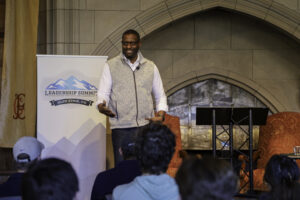 The headlines splashed across newspapers and websites around the country last December and into January certainly weren’t flattering for Southwest Airlines. The airline –annually among the leaders of all airlines in the United States in customer satisfaction – wasn’t making anyone happy with thousands of delayed or canceled flights that left travel-weary customers stranded in airports across the country as they scrambled to return home after the holidays.
The headlines splashed across newspapers and websites around the country last December and into January certainly weren’t flattering for Southwest Airlines. The airline –annually among the leaders of all airlines in the United States in customer satisfaction – wasn’t making anyone happy with thousands of delayed or canceled flights that left travel-weary customers stranded in airports across the country as they scrambled to return home after the holidays.
A massive winter storm caused the initial flight delays and disruptions and turned into a disaster that cost more than $800 million in lost revenue and refunds and reimbursements to customers.
Customer satisfaction fell off, and many Southwest passengers swore they’d never use the airline again after the experience.
Standing in the middle of the storm was ACU graduate Tony Roach (’01), who has been with the airline since 2001, shortly after he graduated with a BBA in Marketing and Management. He started at Southwest as a Field Marketing Coordinator, working his way up the corporate ladder by serving in customer-impacting roles across field marketing, corporate sales, product development, loyalty marketing, customer relations, and customer experience.
Roach has also been tasked with establishing the customer experience corporate function, leading the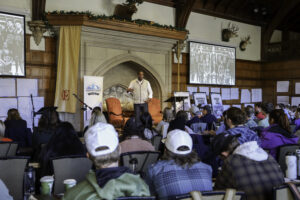 Southwest Promise (the company’s COVID response for customers), spearheading the digital self-service and cabin modernization programs, and executing several other impactful initiatives that continue to generate revenue and improve customer satisfaction.
Southwest Promise (the company’s COVID response for customers), spearheading the digital self-service and cabin modernization programs, and executing several other impactful initiatives that continue to generate revenue and improve customer satisfaction.
In January 2023, he was promoted to Senior Vice President for Marketing and Customer Experience. He will lead the company’s efforts in marketing, product & customer loyalty, digital, customer experience, and customer engagement. Roach’s organization drives customer demand, evolves the Southwest brand, and designs an end-to-end travel journey that maximizes revenue and customer loyalty.
All that to say that Roach leads the departments that have to restore trust in the Southwest brand and win back the customers who were turned off by the problems they experienced during the company’s nightmare winter.
Roach –married and has four children – was recently asked to speak to faculty and students at the annual Leadership Summit in Colorado, touching on various aspects of his Christian leadership style in a secular world and how he has helped lead Southwest Airlines through its most recent trials.
He recently sat down for a question-and-answer session covering everything from his experiences at ACU and in COBA to the company’s response to COVID and the holiday crises. Below is that conversation:
Q: When you look back on your experience at ACU and in COBA, who are some of the people who most influenced you, and what did you take away from them that you’ve carried with you in the corporate world?
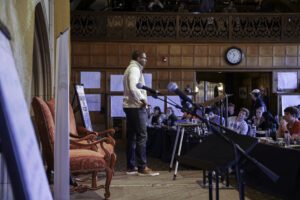 Roach: There are so many people across COBA that I could name. I might not have had direct contact with them, but I recognized they were trying to do things the right way, which made an impact. I really looked up to Dr. (Rick) Lytle, Dr. (Phil) Schubert, and Tim Johnston. Dr. (Gary) McCaleb was one of the most influential people on campus, and I’m forever indebted to him. I was one of the founding members of the LYNAY (Love Your Neighbor As Yourself) group that he led for many years, and he poured into and invested in me. He influenced me in so many ways, including pushing me to strive to be the best I can be in every facet of my life, whether it be in my spiritual life, family, or job. He saw more potential in me than I even saw in myself.
Roach: There are so many people across COBA that I could name. I might not have had direct contact with them, but I recognized they were trying to do things the right way, which made an impact. I really looked up to Dr. (Rick) Lytle, Dr. (Phil) Schubert, and Tim Johnston. Dr. (Gary) McCaleb was one of the most influential people on campus, and I’m forever indebted to him. I was one of the founding members of the LYNAY (Love Your Neighbor As Yourself) group that he led for many years, and he poured into and invested in me. He influenced me in so many ways, including pushing me to strive to be the best I can be in every facet of my life, whether it be in my spiritual life, family, or job. He saw more potential in me than I even saw in myself.
Q: Tell me about the company’s response to the COVID pandemic and what you learned from dealing with all the issues that came about.
Roach: The entire industry was hit hard by COVID because so little was known about how the virus spread. The last thing people thought they needed to do was to get on an airplane. We had to modify how we operated and what the experience would be like for those willing to fly. We did many things like requiring masks and blocking middle seats onboard for social distancing; we even changed how we cleaned the plane after each flight. And we did all those things to help make people comfortable flying again. If you think about what that did to business travel, everything stopped because no one was going to the office. Our team led the customer response, and the lesson learned was that you have to adapt and be ready to pivot.
Q: Go back to the challenges that Southwest faced during the winter with the thousands of flight delays and cancellations, as well as, I’m sure, thousands of unhappy customers. How does Southwest rebuild trust with the public?
Roach: Southwest takes immense pride in taking care of its customers. It’s a huge part of our business model. To see us get to a point where we let a lot of customers down was disheartening for the executive team and frontline workers. It was a hard thing to watch, and it’s been hard to navigate. The first thing we had to do during that time was care for our customers. We had to make sure they knew they could get a refund and that we would help make them whole in other areas. That was the first big thing we did. Now we’re working on rebuilding trust with customers. We’ve always had a great brand, but we recognize that rebuilding trust takes time. So how do you do that? For one, you accept the lessons you learned and make sure you move forward and improve yourself. The second thing is consistency. We have to show we can once again be reliable, and over time we will show that. We’re still the airline everyone has loved for so long, and we’ll come out of this better and stronger. Those are tangible things that we can show customers and employees that we will be better.
Q: In these challenges you’ve been dealing with, how much did you lean on what you learned from your father (Abilene minister Dr. Tony Roach) and at ACU about leading with Christ-centered values?
Roach: You can try to remember some of the subject matter you learn in school, but there are things you learn in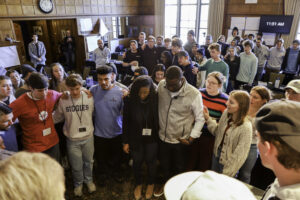 the curriculum, and there are things you learn outside the curriculum. What ACU does is teach you that you can balance a lot of things at once. At ACU, you learn to balance your walk with Christ and academics. You’re blending two things. But I had three when you added athletics (Roach was on the ACU men’s basketball team). Understanding how to pursue and balance what is important to you at once is a skill that can continue to bless your life. I’ve also been lucky to have a father who has given me guidance along the way. He taught me that if you consult with God and walk with Him and abide with Him, He has your back, which keeps everything in perspective. He’s given me a great example; somebody to watch and do things with the right intent.
the curriculum, and there are things you learn outside the curriculum. What ACU does is teach you that you can balance a lot of things at once. At ACU, you learn to balance your walk with Christ and academics. You’re blending two things. But I had three when you added athletics (Roach was on the ACU men’s basketball team). Understanding how to pursue and balance what is important to you at once is a skill that can continue to bless your life. I’ve also been lucky to have a father who has given me guidance along the way. He taught me that if you consult with God and walk with Him and abide with Him, He has your back, which keeps everything in perspective. He’s given me a great example; somebody to watch and do things with the right intent.
Q: You were recently asked to speak at Summit and share your last few months’ experiences. What was your goal in communicating with those students and staff members?
Roach: I was reminiscing that I went to Summit my last year at ACU, so this was a chance to pour back into students sitting in the seats where I once sat. They have so many decisions to come in life and where they’re at. I remember being somewhat overwhelmed by all the decisions that were coming. How do you know what you want to do? If someone had told me then that I’d be doing what I’m doing now, it would have blown me away. I wanted to give them a few things to consider, led by this: what do you think are the principles you need to stay loyal to as you make those decisions? If you remain loyal to the guiding principles, they’ll help guide decisions. And then, I wanted to remind them to be loyal to the gifts that God has given them. We each have values, and if you stay loyal to those, your gift will find its way to you. I reminded them to remain loyal to the Holy Spirit. The gift that God gave all of us is the Holy Spirit. If we stay loyal to listening to the Holy Spirit, that will lead us on our path. Finally, I reminded them to stay loyal to our mission as Christians. We serve the Kingdom. If we stay loyal to serving the mission of the Kingdom, that will guide us in all the decisions we make. My goal through all of that was to tell them it’s OK if they don’t know yet where to go from here. But to stay loyal to their principles because they will guide their paths.
 We will highlight each of the seven over the next month, including this profile of Matthew Roberson, a native of Weatherford who carries a 4.0 GPA and is graduating with a degree in accounting. After graduation, Matthew plans to complete his Master of Accountancy with ACU and continue his audit internship with Condley and Company.
We will highlight each of the seven over the next month, including this profile of Matthew Roberson, a native of Weatherford who carries a 4.0 GPA and is graduating with a degree in accounting. After graduation, Matthew plans to complete his Master of Accountancy with ACU and continue his audit internship with Condley and Company.  We will highlight each of the seven over the next month, including this profile of Kathryn Crawford. A native of Flower Mound, Texas, Kathryn carries a 4.0 GPA and is graduating with a BBA degree double majoring in Financial Management and Management with a concentration in Leadership. After graduation, she will travel this summer and serve as a Resident Advisor for the Leipzig Study Abroad program.
We will highlight each of the seven over the next month, including this profile of Kathryn Crawford. A native of Flower Mound, Texas, Kathryn carries a 4.0 GPA and is graduating with a BBA degree double majoring in Financial Management and Management with a concentration in Leadership. After graduation, she will travel this summer and serve as a Resident Advisor for the Leipzig Study Abroad program. While at ACU, Garrett has been heavily involved in academic and campus life pursuits. He has served as Dr. James Prather’s research assistant, researching metacognition, programming error messages, and novice programmers. Seven of his articles have been published on various platforms over the last three years.
While at ACU, Garrett has been heavily involved in academic and campus life pursuits. He has served as Dr. James Prather’s research assistant, researching metacognition, programming error messages, and novice programmers. Seven of his articles have been published on various platforms over the last three years. A double major in accounting and finance, she has already accepted a job offer at Weaver, an accounting firm in downtown Fort Worth. She is in the process of applying to schools across Texas so she can work toward getting her MBA.
A double major in accounting and finance, she has already accepted a job offer at Weaver, an accounting firm in downtown Fort Worth. She is in the process of applying to schools across Texas so she can work toward getting her MBA. Written by special contributor Lance Fleming
Written by special contributor Lance Fleming That is part of the university with which ACU students have partnered this semester. In addition to donating a warehouse full of airline seats, Southwest has also provided funds for CATIE to build a leatherworking workshop and to provide training for people in the area who are interested (primarily women). The women come from around the region to learn leatherworking and business skills.
That is part of the university with which ACU students have partnered this semester. In addition to donating a warehouse full of airline seats, Southwest has also provided funds for CATIE to build a leatherworking workshop and to provide training for people in the area who are interested (primarily women). The women come from around the region to learn leatherworking and business skills. The students’ client is called Wearsos – the first business to come out of the leather project – and it was started by Corvaglia and Riquelme. Aside from upcycled bags, the company also plans to make other products like passport holders, wallets, luggage tags, and shoes, but according to Phillips, the initial launch will be with three different styles of bags.
The students’ client is called Wearsos – the first business to come out of the leather project – and it was started by Corvaglia and Riquelme. Aside from upcycled bags, the company also plans to make other products like passport holders, wallets, luggage tags, and shoes, but according to Phillips, the initial launch will be with three different styles of bags. case, Wearsos. So far, in four years of teaching the class, each client has been in Costa Rica, although Philips said future classes could certainly take on a domestic client or a client in a foreign country other than Costa Rica. Phillips also said that she wants the students to learn problem-solving and critical-thinking skills each year to serve them when they enter the workforce.
case, Wearsos. So far, in four years of teaching the class, each client has been in Costa Rica, although Philips said future classes could certainly take on a domestic client or a client in a foreign country other than Costa Rica. Phillips also said that she wants the students to learn problem-solving and critical-thinking skills each year to serve them when they enter the workforce. “Finally, we hope the students will learn that consulting (and any cross-cultural project) is a co-creation between the parties involved,” she said. “We do not go to Costa Rica to solve our clients’ problems or fix their issues. We work with the client to develop solutions that will work in their context. We try hard to squash the ‘savior’ complex that people in general – and Americans specifically – sometimes bring to other contexts. We also try to cultivate the idea that everyone has valuable ideas and skills to bring to the project.”
“Finally, we hope the students will learn that consulting (and any cross-cultural project) is a co-creation between the parties involved,” she said. “We do not go to Costa Rica to solve our clients’ problems or fix their issues. We work with the client to develop solutions that will work in their context. We try hard to squash the ‘savior’ complex that people in general – and Americans specifically – sometimes bring to other contexts. We also try to cultivate the idea that everyone has valuable ideas and skills to bring to the project.” The headlines splashed across newspapers and websites around the country last December and into January certainly weren’t flattering for Southwest Airlines. The airline –annually among the leaders of all airlines in the United States in customer satisfaction – wasn’t making anyone happy with thousands of delayed or canceled flights that left travel-weary customers stranded in airports across the country as they scrambled to return home after the holidays.
The headlines splashed across newspapers and websites around the country last December and into January certainly weren’t flattering for Southwest Airlines. The airline –annually among the leaders of all airlines in the United States in customer satisfaction – wasn’t making anyone happy with thousands of delayed or canceled flights that left travel-weary customers stranded in airports across the country as they scrambled to return home after the holidays. Southwest Promise (the company’s COVID response for customers), spearheading the digital self-service and cabin modernization programs, and executing several other impactful
Southwest Promise (the company’s COVID response for customers), spearheading the digital self-service and cabin modernization programs, and executing several other impactful  Roach:
Roach:  the curriculum, and there are things you learn outside the curriculum. What ACU does is teach you that you can balance a lot of things at once. At ACU, you learn to balance your walk with Christ and academics. You’re blending two things. But I had three when you added athletics (Roach was on the ACU men’s basketball team). Understanding how to pursue and balance what is important to you at once is a skill that can continue to bless your life. I’ve also been lucky to have a father who has given me guidance along the way. He taught me that if you consult with God and walk with Him and abide with Him, He has your back, which keeps everything in perspective. He’s given me a great example; somebody to watch and do things with the right intent.
the curriculum, and there are things you learn outside the curriculum. What ACU does is teach you that you can balance a lot of things at once. At ACU, you learn to balance your walk with Christ and academics. You’re blending two things. But I had three when you added athletics (Roach was on the ACU men’s basketball team). Understanding how to pursue and balance what is important to you at once is a skill that can continue to bless your life. I’ve also been lucky to have a father who has given me guidance along the way. He taught me that if you consult with God and walk with Him and abide with Him, He has your back, which keeps everything in perspective. He’s given me a great example; somebody to watch and do things with the right intent.